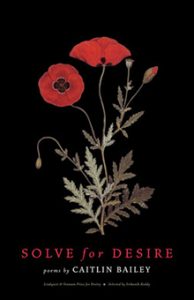
Published by Milkweed Editions
Obsessive images of apples, snakes, horses, birds, and bombs abound in Caitlin Bailey’s debut poetry collection, Solve for Desire, winner of the 2017 Lindquist and Vennum Prize for Poetry.
Bailey explores “the shape of absence” through Grete and Georg Trakl, Austrian siblings who, in the early twentieth century, were speculated to have had an incestuous relationship. Georg was a poet who struggled with addiction and depression, eventually dying of an overdose after completing several tours in the army. Grete, a pianist, committed suicide less than three years later. Bailey writes persona poems from Grete’s point of view, a perspective that history has largely ignored—bringing back to life the voice of someone who has experienced immense loss and existed in a time of limited female agency. Her poems constitute a “tender cartography” of these historical figures, interrogating the lines between desire and love, appetite and restraint, distance and grief.
Bailey imagines pieces of their lives detailed only briefly in historical texts. When Georg almost drowned in a pond, “that terrible blue mouth,” Grete writing to Georg of “the salt packed in [her] organs, the magnificent shore.” Oscillating between plainspoken and lush, lyrical language, a “gorgeous mash of syllables,” her poems seem to “expand till they shatter, made spectacular by ruin.” Though they are expressed through Grete’s eyes and focus on her particular tragedies, Bailey’s poems resonate in an approachable way. Through Grete’s pain we, too, are thinking of “the ghost of our loss and what comes after”—Lorna Pecard